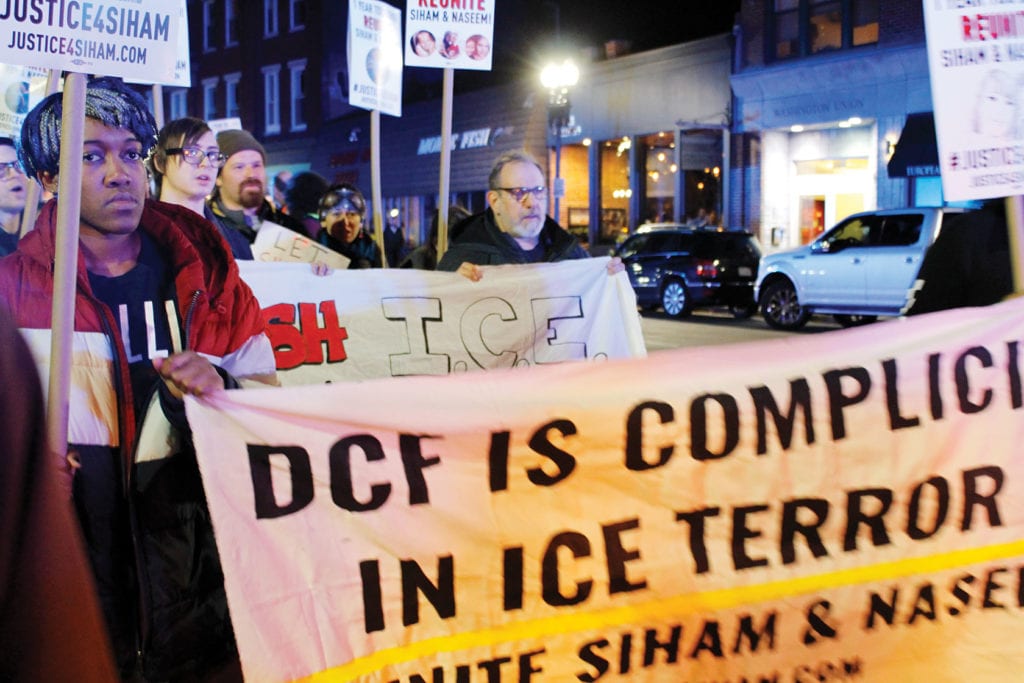Anti-ICE protest calls out DCF in separation case
South End march marks one year since mother deported and son placed in DCF custody

Siham Byah packed her 8-year-old son Naseem Byah’s lunch, walked with him to school, told him to be a good boy for his teachers and kissed him goodbye. Tuesday, Nov. 7, 2017 had begun like any other school day for the Moroccan-born single mother and asylum seeker.
“It was a normal day for me, it was a normal day for my child,” said Byah.
That was until she left her home in Nahant to attend her annual appointment at the U.S. Immigration and Customs Enforcement (ICE) office in Burlington, where she was unexpectedly detained for almost two months before being transferred to a jail in Virginia and deported to Morocco. Her son was placed in the custody of the Department of Children and Families (DCF).
A year later, Byah is still in Morocco living with her parents, while DCF has ruled that her son cannot be returned to her.
“My crime was just the fact that I have a voice and I am an immigrant,” said Byah, phoning in to speak with the 50 marchers who gathered last week on Tremont Street in the South End to commemorate the one-year mark since the family was forcibly separated by ICE officials.
“I am denied parental rights solely because I am an immigrant,” said Byah.
The Moroccan-born mother lived in the U.S. for 18 years and was a well-known activist in Boston, so news of her deportation quickly spread, said Hersch Rothmel, one of the demonstration’s organizers involved in the Free Siham campaign. Other affiliated members supporting Byah’s cause include advocates from If Not Now and Cosecha, both co-sponsors of the Nov. 7 evening march from 640 Tremont St. to Peters Park on Washington Street.
This coalition of supporters has been fighting for the family’s reunification for a year — “one year too long,” as marchers’ signs read. Their efforts began with the emergency rally shortly following Byah’s deportation, outside of the John F. Kennedy Federal Building. Last week’s protest came after the DCF’s final decision, announced on Oct. 24, placed Naseem in the care of his father in Maine until he reaches the age of 18.
Five demands
The rally not only marked the anniversary of the family’s separation, but was organized to raise awareness for Byah’s plight and make five demands of ICE and the DCF: the family’s reunification; for DCF to actively oppose future deportations by ICE; for Massachusetts’ jails to terminate their contracts with ICE; for deportations to stop and ICE abolished; and for Byah’s deportation and the mental and physical abuse she said she suffered while in ICE custody to be investigated.
Rothmel said that it is still unclear why ICE decided to deport Byah after almost two decades of U.S. residency. ICE did not respond to the Banner’s request for comment.
For many unauthorized immigrants considered a low priority for deportation, an annual check-in at their nearest ICE office is routine. It allows officers to use their time and resources deporting those who pose a threat, like convicted criminals, giving no-threat immigrants like Byah relative security to build lives and families in the U.S. But the executive order signed by President Trump in January expanded the list of deportable offenses and it now includes living in the country illegally.
“I thought when I don’t commit a crime then my life won’t be torn apart,” said Byah last week. “I did not think the United States was capable of such inhumanity.”
While Byah expressed gratitude for campaigners’ support during her phone-in, the vocal activist said she will not let 3,500 miles diminish her own fight for her son.
“I have all the time to break down and cry after I have won this war,” she said, adding, “I’m not going to sit here feeling helpless, feeling guilty.”
Rothmel said the campaign will be raising funds and finding pro bono legal representation for Byah so that she can appeal DCF’s decision in family court.
“We were completely devastated when we heard the news,” said Rothmel about the DCF’s ruling. “We’re still trying to figure out what happened.”
According to Rothmel, reasons given by DCF for not returning Naseem to his mother included allegations that she suffers from substance abuse, has no schooling organized for him and that she does not live in a stable home in Morocco. He said these were “baseless and arbitrary claims … not rooted in truth.”
Clarity was sought from the Massachusetts DCF, but according to DCF Director of Public Affairs Andrea Grossman, the department cannot discuss individual cases due to state and federal confidentiality laws.
Advocates want to pressure DCF until officials are forced to revise their decision, and their next meeting, scheduled for Nov. 14, will be to discuss escalation tactics, Rothmel said.
Meanwhile, Byah is left remembering treasured moments with her son, when he would jump into her bed to cuddle before their morning alarm clock heralded another day.
“I wish I had the capability of holding that moment,” she said, “to kiss him one more time, to breathe him in, but I can’t.”






